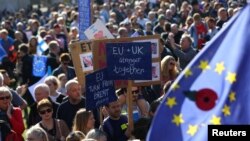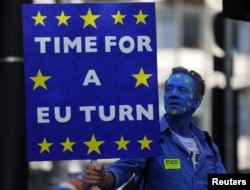Thousands of protesters gathered in central London on Saturday to call for a new referendum on Britain's departure from the European Union.
Organizers want the public to have a final say on the government's Brexit deal with the EU, arguing that new facts have come to light about the costs and complexity of Britain's exit from the bloc since Britons voted to leave in 2016.
London Mayor Sadiq Khan from the opposition Labor Party was among those set to address the People's Vote March, which will culminate at a rally in Parliament Square.
Organizers have brought in some 150 buses to ferry thousands of activists from across the country to the British capital.
Those in favor of pulling Britain out of the EU won by 52 percent in the 2016 EU membership referendum. Prime Minister Theresa May of the Conservative Party has ruled out another public vote on the subject.
Britain is scheduled to leave the EU on March 29, but negotiations have been plagued by disagreements, particularly over the issue of the border between the Republic of Ireland and Northern Ireland. It will be the U.K.'s only land border with the EU after Brexit, for Ireland is part of the EU, and Northern Ireland is part of the U.K.
There are growing fears of a “no-deal” British exit, which could create chaos at the borders and in both the EU and the British economies.
May, speaking at an inconclusive EU summit in Brussels this week, said she would consider having a longer post-Brexit transition period — one that could keep Britain aligned to EU rules and obligations for more than two years after its March departure. Pro-Brexit politicians in Britain, however, saw it as an attempt to bind the country to the bloc indefinitely.
“This week's fresh chaos and confusion over Brexit negotiations has exposed how even the best deal now available will be a bad one for Britain,” said Andrew Adonis, a Labor member of the House of Lords. “Voters will neither forgive nor forget if [lawmakers] allow this miserable Brexit to proceed without people being given the final say.”





